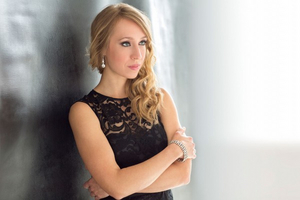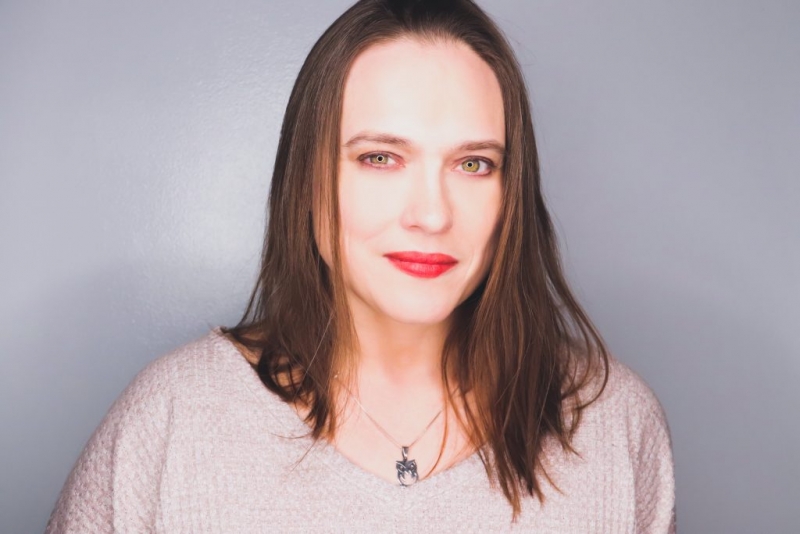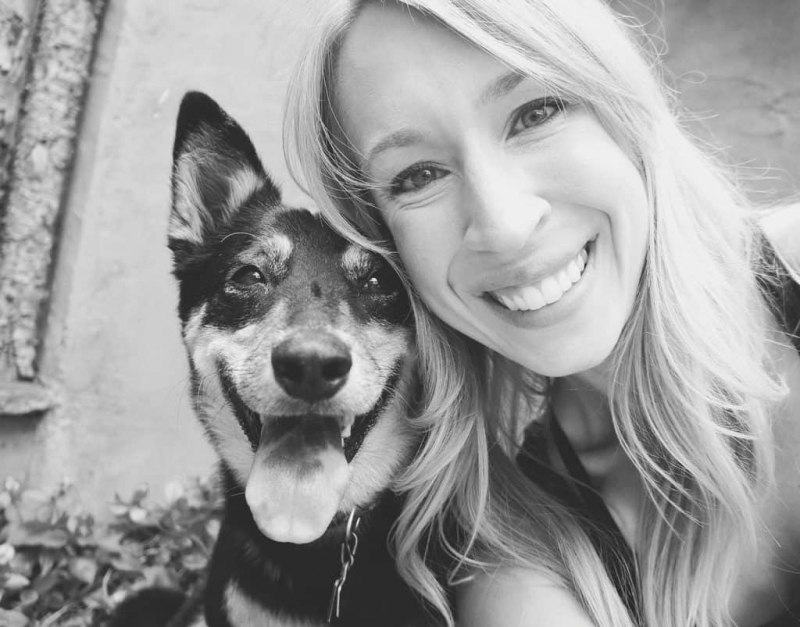Interview: Emily Fons of San Diego Opera's THE BARBER OF SEVILLE at Pechanga Arena
A mezzo soprano who loves variety in music and in life.

As I write this, mezzo soprano Emily Fons is driving from her home in Milwaukee to San Diego to rehearse the role of Rosina, the wife of roving-eyed count Almaviva in The Barber of Seville by Rossini. Three years ago Fons sang Cherubino here in the related comic opera The Marriage of Figaro by Mozart. The switch to the count's wife from Mozart's Cherubino, a 15-year-old boy and randy rival of the philandering count, is an indication of the mezzo's acting and vocal versatility. I discovered when we met via Zoom (what else?) that her adventurous openness to new roles is typical of the mezzo's approach to life.
Is it fair to say that you welcome a challenge, Emily?
Oh definitely! I feel fortunate that I haven't been pigeon-holed into one composer or type of role. But actually, I feel a similarity between Cherubino and Rosina. They are both testing social boundaries, and I like their youthful exploration and challenge of authority.
The thirst for variety seems to extend beyond your professional life.
Most definitely. I'm rarely sitting, unless I've gone down a rabbit hole on the internet investigating a recipe or a topic.
Given the range of your interests, musical and otherwise, how do you prioritize your time?
As an artist you can't wait for inspiration. Even if my voice doesn't feel great that day or I don't feel mentally sharp, I just have to sit down with my planner, go through my music and write down the page numbers I'm working on. Without discipline the day can really get away from me.
Last time you were here you managed to be both acrobatic and funny while singing well. This production will be quite different because of social distancing and parking-lot staging.
Very different. Our director Keturah Stickann is absolutely fantastic. Because of

COVID protocols, we've condensed to 86 minutes while keeping to the original story line in colorful, comic bursts and segments. We have to be grateful we get to do this live at all and just enjoy ourselves and give the audience a great time.
You were probably best known for performances of Rossini and earlier composers when you received a Grammy nomination for the recording of Cold Mountain by contemporary composer Jennifer Higdon.
It was the culmination of an exciting special project. Even though we didn't win, it was a wonderful recognition of how hard everyone worked, and I'm proud of what we put together.
The modern operas you've sung are reasonably melodic, but still a long way from Rossini. Did you find them more difficult?
Definitely. All that interval training and theory from when I was maybe 19-years old comes back. But actually, the rhythms are often more challenging than the melody or harmonies--or lack of them. So that's usually where I spend the most time. I've also found I have to distance myself emotionally. The second I start to get frustrated I stop making progress.
Speaking of frustration, COVID came at a particularly bad time for you. Your career was really blossoming, but the Boston Lyric Opera had to cancel and also a role in Germany you were especially looking forward to disappeared.
Thankfully, Germany has been rescheduled, as was the Rossini in San Diego, but yes. I mean I had to kind of let go of the disappointment of my normal life and income just disappearing for a full year.
But you've kept busy and productive.
I've always prioritized building good relationships, so I found a lot of different projects with a lot of different people. I had a part time job at a furniture store. I've also been teaching, working on a book, and doing Zoom master classes. I'll be leading a camp on arts and business this summer. It's been absolutely crazy.
In less hectic earlier times your vocal range and agility probably left you with a choice of soprano or mezzo?
Yes. All through graduate school I was still singing soprano stuff. Neither range was particularly easy for me at the extreme ends. There's always some keyboard warrior ready to tell me I have no low notes or something. But I knew if I chose to be a soprano I'd be struggling with the top my whole life. I've always kind of prioritized storytelling and acting anyway. I just thought mezzo was a better fit with more roles I feel comfortable in. You know, in some ways I wish the industry wasn't so rigid. There are roles from both I'd love to do.
Your first stage appearance was at seven in a musical. Do you ever get the urge to do Broadway?
You know we each got a flower after that performance. They gave us a carnation and I dried mine and put it in a little box. I still have it. Yes. I would love to try something from Broadway. I like to dance, and I'm not afraid to take a risk. One of the best pieces of advice I ever got was say yes to everything and figure out how to do it later.
So after a road adventure, you'll be in San Diego, with your dog Lupita?
Oh yeah, she's coming. Last time we were there, Lupita and I did the five PIP-

(Photo Credit Emily Fons)
challenge mission trails. If you take a selfie with the summit sign at each one, the ranger station prints a little certificate that says you did it. I told them, you know my dog Lupita also completed it. They thought that was hilarious and printed a certificate showing that Lupita the Australian Kelpie had completed the challenge too.
Perhaps the only dog ever with proof, and certainly the only Australian Kelpie! Tell me about some of your favorite composers.
I feel the most affinity for Baroque music and Handel's my favorite by far. There's something about the clarity of the counterpoint and the texture, and you get those beautiful logical arias followed by lightning-bolt speed. Sometimes I like to just take off with that coloratura and luxuriate in it.
Some modern music is great too. I loved working with Jennifer Higdon. She was so generous with the singers, adjusting to what we needed. And I got a chance to work with Mason Bates who is just so cool. I like Jake Heggie's music too, but I'd be willing to work with any living composer. I love their sense of gratitude for the performers. They seem genuinely thrilled to see their work come to life.
Was there a time when you first thought to yourself, I can do this?
I think to be a successful performer you always have to feel that way. You need that belief from early on.
You felt that way when you were seven?
I did, I did. I always accepted rejection without taking it too personally. But when I got into the Ryan Center at the Lyric Opera of Chicago, it did feel like a huge deal.
Another moment came when I was a young artist at Chicago Lyric and artistic administrator Andy Mellanox called me into his office and said, "Emily, someone had to cancel, and we'd like you to sing a duet with Renee Fleming, if that works for you." I was like, I mean, are you kidding! It was a surreal moment. I was looking at the person next to me in a Millennium Park concert with 15,000 people. I'm thinking, she's been on my CD covers, a person I never thought I'd stand next to, and I started to feel I really was part of the same world.
I never take those moments for granted. It's such a roller coaster of really high highs and really low lows.
What about those lows?
There was a time when I was going through some difficult personal things, and I will never forget the support of my manager and others. As a performer you don't often have the option of saying you're not feeling great or have some technical things to sort out. Unfortunately, sometimes that means getting written up in the paper the next day as being the worst thing anyone's seen on stage that year.
The support you got is probably why you've stayed with both the same vocal coach and manager for so many years?
Yes, it is. Michael Benchetrit, my manager, has a lot of integrity. I think he cares about the uniqueness of his artists and the fact that you are a human being. My voice teacher Connie Haas is the same way. I think of them both as very true friends
Given your many interests you probably enjoy traveling more than most performers.
I've calmed down a little. When I first started. if I wasn't at rehearsal I was finding something to see or do. I feel fortunate that I've gotten to see so much of the world, but I do prioritize stability and quality of life at home. That's why during this pandemic I've worked really hard to be a truly American singer. Many colleagues quickly left for Europe and tried to build a career there. I've worked mostly in the US because what I have and do at home are so important to me. I love Europe and I'm happy to go maybe once a year, but not for four months. Michael knows I've turned some things down because I want a balance in my life and I just don't want to be gone that long from a family I love very much.
Are there places you'd especially like to go back to?
Yes, I never thought in my life I'd end up in Japan. Now I've been there twice and we've had to reschedule a third trip. I feel so fortunate to have worked with Seiji Ozawa, and Japan is such a unique and beautiful place. The Handel festival in Göttingen, Germany is another happy place. I would go back at the drop of a hat.
As you travel have you spent a lot of time on language accents to match musical phrasing?
Definitely, even if it's a role I've done before I try to check in with a coach so that every time I improve. But sometimes it makes me laugh when what I hear from native speakers doesn't match a coach's direction.
You have the lead in Cinderella in Nashville after San Diego.
We're doing just one show in this gigantic Ascend Amphitheater where they usually do the Country Music Awards. We'll be flying by the seat of our pants live, music pumped out on the speaker system. Our director said it's going to sound and feel like a rock concert, so just have fun.
You've been very active with the San Diego opera; their YouTube channel is filled with Emily videos.
I like the way the San Diego opera engages with the community. I've never seen anything like it before. An opera company should give kids a taste of something different with an informal approach. Opera is storytelling, costumes, music, color, and sound, not a diva in a corset and a pointy metal helmet.
When I was in San Diego for Marriage of Figaro, I talked to John Gabriel, head of the Education Department. John and I just started trying stuff, so I made these educational videos.
When I'm on a job I always try to work with school children and their teachers. People should have more fun at the opera than they do, and I want these kids to see me in my jeans and tennis shoes, just a real person who's doing this crazy thing and not a fancy opera singer.
Emily, your work with John is a credit to both you and the company. Is there anything you'd like to add to what we've discussed?
I would add that my experience with San Diego isn't like my usual operatic-voice coaching. I just let the students guide what happens. With one we do exclusively mariachi music. Others like to sing R&B, musical theater, or Taylor Swift. That's a positive for me out of the pandemic. I feel strongly that we need to be open as musicians to music of all types, to engage as many people as possible, and I'm very thankful that the San Diego company trusted me and is out there in the community just promoting music, period. That I've had a chance to explore that with these kids is important to me, and very satisfying.
The Barber of Seville will be performed at the Pechanga Arena 7:30 pm on April 25, 27, 30, and May 1. For ticket and other information visit San Diego Opera.
Uncredited photos compliments of San Diego Opera.
Comments

Videos

